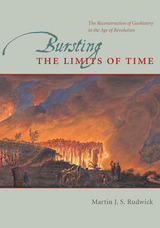
Addressing this intellectual revolution for the first time, Rudwick examines the ideas and practices of earth scientists throughout the Western world to show how the story of what we now call "deep time" was pieced together. He explores who was responsible for the discovery of the earth's history, refutes the concept of a rift between science and religion in dating the earth, and details how the study of the history of the earth helped define a new branch of science called geology. Rooting his analysis in a detailed study of primary sources, Rudwick emphasizes the lasting importance of field- and museum-based research of the eighteenth and nineteenth centuries.
Bursting the Limits of Time, the culmination of more than three decades of research, is the first detailed account of this monumental phase in the history of science.
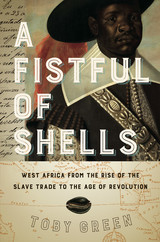
With A Fistful of Shells, Toby Green transforms our view of West and West-Central Africa by reconstructing the world of these kingdoms, which revolved around trade, diplomacy, complex religious beliefs, and the production of art. Green shows how the slave trade led to economic disparities that caused African kingdoms to lose relative political and economic power. The concentration of money in the hands of Atlantic elites in and outside these kingdoms brought about a revolutionary nineteenth century in Africa, parallel to the upheavals then taking place in Europe and America. Yet political fragmentation following the fall of African aristocracies produced radically different results as European colonization took hold.
Drawing not just on written histories, but on archival research in nine countries, art, oral history, archaeology, and letters, Green lays bare the transformations that have shaped world politics and the global economy since the fifteenth century and paints a new and masterful portrait of West Africa, past and present.
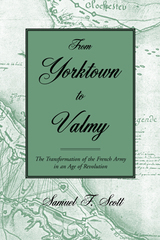
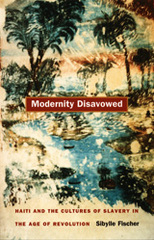
Fischer draws on history, literary scholarship, political theory, philosophy, and psychoanalytic theory to examine a range of material, including Haitian political and legal documents and nineteenth-century Cuban and Dominican literature and art. She demonstrates that at a time when racial taxonomies were beginning to mutate into scientific racism and racist biology, the Haitian revolutionaries recognized the question of race as political. Yet, as the cultural records of neighboring Cuba and the Dominican Republic show, the story of the Haitian Revolution has been told as one outside politics and beyond human language, as a tale of barbarism and unspeakable violence. From the time of the revolution onward, the story has been confined to the margins of history: to rumors, oral histories, and confidential letters. Fischer maintains that without accounting for revolutionary antislavery and its subsequent disavowal, Western modernity—including its hierarchy of values, depoliticization of social goals having to do with racial differences, and privileging of claims of national sovereignty—cannot be fully understood.
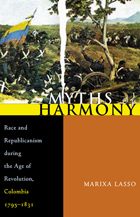
This book centers on a foundational moment for Latin American racial constructs. While most contemporary scholarship has focused the explanation for racial tolerance-or its lack-in the colonial period, Marixa Lasso argues that the key to understanding the origins of modern race relations are to be found later, in the Age of Revolution.
Lasso rejects the common assumption that subalterns were passive and alienated from Creole-led patriot movements, and instead demonstrates that during Colombia's revolution, free blacks and mulattos (pardos) actively joined and occasionally even led the cause to overthrow the Spanish colonial government. As part of their platform, patriots declared legal racial equality for all citizens, and promulgated an ideology of harmony and fraternity for Colombians of all colors. The fact that blacks were mentioned as equals in the discourse of the revolution and later served in republican government posts was a radical political departure. These factors were instrumental in constructing a powerful myth of racial equality-a myth that would fuel revolutionary activity throughout Latin America.
Thus emerged a historical paradox central to Latin American nation-building: the coexistence of the principle of racial equality with actual racism at the very inception of the republic. Ironically, the discourse of equality meant that grievances of racial discrimination were construed as unpatriotic and divisive acts-in its most extreme form, blacks were accused of preparing a race war. Lasso's work brings much-needed attention to the important role of the anticolonial struggles in shaping the nature of contemporary race relations and racial identities in Latin America.
READERS
Browse our collection.
PUBLISHERS
See BiblioVault's publisher services.
STUDENT SERVICES
Files for college accessibility offices.
UChicago Accessibility Resources
home | accessibility | search | about | contact us
BiblioVault ® 2001 - 2024
The University of Chicago Press









